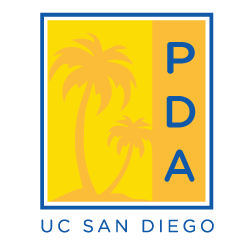
Kristen Tolson, Ph.D.
Regulatory Writer | Synchrogenix, a Certara company

- Interview Overview
Interview Overview
Interviews and Editing by: Alexandra Bortnick
Interview: April 2017
Transition: August 2016
1. Please list your previous department at UC San Diego and provide a brief description of the research you conducted?
I was in the Kauffman lab in the Reproductive Medicine department and studied reproduction, puberty, and obesity.
2. Please describe your current job profile?
I primarily write clinical and preclinical regulatory documents that will go to the FDA or EMA (the EU equivalent), but also work on documents more familiar within academia such as manuscripts, posters, and oral presentations for meetings. Synchrogenix has contracts with multiple clients in pharma and biotech (but my position is salaried), so over a short period of time I’ve gained experience with a wide variety of regulatory documents and have been able to see how different clients approach them. We have offices around the globe and so I’m frequently working on projects with people in other offices in the US and other countries.
3. What made you decide to transition into your current position?
A number of things converged to bring me to this current position. First, I have a strong background in writing and creating successful presentations – I used to joke with my friends that someone should pay me to make the posters and talks for their lab, not knowing that there were jobs out there that would match with that interest. I love communicating about science and knew I wanted a job that let me have more time talking about science than doing bench work, so I was planning on teaching at a SLAC or community college. However, I was also interested in a job with more reasonable and predictable hours. Then I had a baby and that became a non-negotiable for me. I had several friends who were in medical writing jobs and so I started talking with them about transitioning approximately 8 months before I moved to my new job. I didn’t know a lot about regulatory writing specifically, so I learned more about it and Synchrogenix specifically and thought they would be an ideal fit for starting out in the field.
4. Apart from the research you conducted, do you feel like anything in particular has helped you acquire your current position?
My writing experience, especially experience with technical writing (things like IACUC protocols and standard operating procedures for the lab), as well as my expertise communicating with non-scientists. Frankly, my specific research experience wasn’t particularly important – they just wanted the basic biology background with critical thinking skills. My work coordinating large events with the Postdoc Association (PDA) plus collaborations with people who were in other cities and countries helped demonstrate project management capacity. And, most importantly, “organic” networking for lack of a better term, meaning that I built and maintained long-term relationships with my classmates, lab mates, and collaborators, but not for the purpose of finding a job. That ended up providing resources to learn about the different career paths that my friends took, and then (much later) resulted in having friends within the industry who were happy to provide my resume to hiring managers and vouch for my skills.
5. Please list some of the most striking similarities and differences between your postdoc and current position?
The hours are much more stable and predictable (no midnight time points!), but that isn’t true for all medical/regulatory writing positions. The pace is much quicker and there are hard deadlines that must be met. You see results and finish projects on a swifter timetable, which gives me a great sense of accomplishment. On the other hand, you might never see that product again, which is very different from my postdoc where I worked on some projects for years. I still get to use my critical thinking and analyze data, I just don’t have to produce the data! And doing document reviews with clients is a lot like having your PI review your paper, they might love it or they might hate it and want to rewrite it. As one might expect from regulatory writing, there are a lot of rules that have to be followed.
6. Is there any specific challenge (during the entire process of transitioning) that you would like to highlight and, if so, how did you overcome it?
Starting out in my new position was a lot like when I switched fields for my postdoc – I went from being an expert to feeling like I didn’t know anything, which I hate. Synchrogenix also has a very intensive quality control initiative for new hires that requires a lot of knowledge of grammar and other stuff that English and language majors may know and love, but most scientists do not. I knew that I’d be frustrated for the first few months until I had more expertise, so I gave myself 6 months before I was allowed to make any decisions about this as a career path, and by that time I was loving it!
7. Please describe your goals and ambitions for the next 5 years?
There’s a pretty defined career path at Synchrogenix, and I plan to continue learning new documents and expanding my expertise so I can move up the ladder. I’m also looking into becoming RAC certified in a year or two.
8. What do you feel you could have done more, as a postdoc, to help prepare you for or acquire your current position?
If I had considered this path earlier I would have joined SDRAN and learned more about the regulatory process – it probably would have made the transition easier as well. UC San Diego’s Extension program has courses about regulatory affairs that also could have been helpful. I think my experience in outreach, presenting and writing for multiple audiences, and leading diverse teams helped a lot.
9. What do you feel is the most important advice you can give to a current UCSD postdoc in order for them to obtain a position such as yours?
Get out of the lab! It’s important to do your bench work, but make sure you are also building “soft skills” and maintain relationships with your friends and coworkers. If you can do some contract or volunteer writing, or even technical writing for your lab, that will help too. And give yourself plenty of time to transition but also the flexibility to move quickly if you get an offer, it could take 6+ months or only weeks to get an offer, it just depends on what is available at the time.
